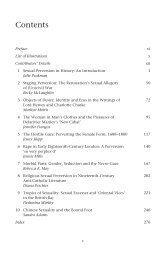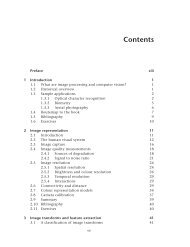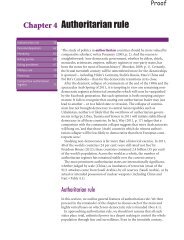The Nameless Shamelessness of Ulysses - Palgrave
The Nameless Shamelessness of Ulysses - Palgrave
The Nameless Shamelessness of Ulysses - Palgrave
You also want an ePaper? Increase the reach of your titles
YUMPU automatically turns print PDFs into web optimized ePapers that Google loves.
<strong>The</strong> ‘nameless shamelessness’ <strong>of</strong> <strong>Ulysses</strong> 35<br />
war little attention was being paid to the publication <strong>of</strong> potentially libellous<br />
short stories. <strong>The</strong> absence <strong>of</strong> that secretive dash, in fact, has by now<br />
come to seem an integral part <strong>of</strong> a distinctly Joycean aesthetic in which<br />
fictional events are deeply and perhaps inextricably embedded in the historical<br />
realities <strong>of</strong> Edwardian Dublin. According to his brother Stanislaus, when<br />
Joyce began work on the novel that would eventually become A Portrait<br />
<strong>of</strong> the Artist as a Young Man (1914), he initiated an even more aggressive<br />
assault on the constraints imposed by the restrictions <strong>of</strong> libel law: ‘Jim<br />
is beginning his novel, as he usually begins things, half in anger It is<br />
to be almost autobiographical, and naturally as it comes from Jim, satirical.<br />
He is putting a large number <strong>of</strong> his acquaintances into it, and those<br />
Jesuits he has known. I don’t think they will like themselves in it.’ 32<br />
Portrait, <strong>Ulysses</strong> and Finnegans Wake all make use <strong>of</strong> this same technique<br />
and generations <strong>of</strong> critics have devoted considerable effort to revealing –<br />
inadvertently perhaps – that Joyce indulged in an essentially unprecedented<br />
campaign <strong>of</strong> libel. Herbert Gorman in an early biography written under<br />
Joyce’s own careful guidance notes the frustrating inability <strong>of</strong> many readers<br />
‘to crack the hard nuts <strong>of</strong> certain paragraphs containing comments on actual<br />
personalities’ and concludes that an intimate knowledge <strong>of</strong> Dublin ‘might<br />
heighten one’s enjoyment, for the scandalous aspects <strong>of</strong> [<strong>Ulysses</strong>] would<br />
then be more greatly emphasized’. 33 <strong>The</strong> extensive guides and annotations,<br />
which provide maps indicating the precise location <strong>of</strong> Davy Byrne’s and<br />
references to real figures, further reinforce the importance <strong>of</strong> this kind <strong>of</strong><br />
material for the book, revealing just how aggressively Joyce invaded not<br />
only the outhouses and whorehouses <strong>of</strong> the city, but its historical realities<br />
as well.<br />
In taking the importance <strong>of</strong> such information for granted, however, we<br />
inadvertently overlook the scandalous libels which pervade Joyce’s work and<br />
which amount to an aggressive assault on the legal bar against defamation<br />
which wrecked one <strong>of</strong> his early attempts to publish Dubliners. Certainly, the<br />
risks he initially incurred have now receded. In American jurisprudence the<br />
First Amendment’s protection <strong>of</strong> free speech has significantly constrained<br />
the reach <strong>of</strong> libel, whilst the civil laws in Britain state that the dead cannot<br />
be libelled. Unlike the potent sexuality which still has the power to rankle<br />
and even shock some readers when they come across it, therefore, the dense<br />
web <strong>of</strong> names and the multifold acts <strong>of</strong> revenge which pervade Joyce’s works<br />
are no longer the stuff <strong>of</strong> legal wrangling and public scandal. <strong>The</strong> first time<br />
<strong>Ulysses</strong> enters a British or Irish court <strong>of</strong> law, however, the case involves<br />
neither Gerty’s thighs nor Molly’s memories, but Reuben J. Dodd who files<br />
a suit for libel. 34 In the ‘Hades’ episode, Martin Cunningham tells a story<br />
about Dodd’s apparent attempt to commit suicide by jumping into the Liffey<br />
and his father’s miserly <strong>of</strong>fer <strong>of</strong> a florin to the boatman who saved his son’s<br />
life. In 1954 the BBC broadcast a reading <strong>of</strong> <strong>Ulysses</strong> featuring this episode and<br />
Dodd promptly secured from the High Court <strong>of</strong> Dublin a summons on the
















